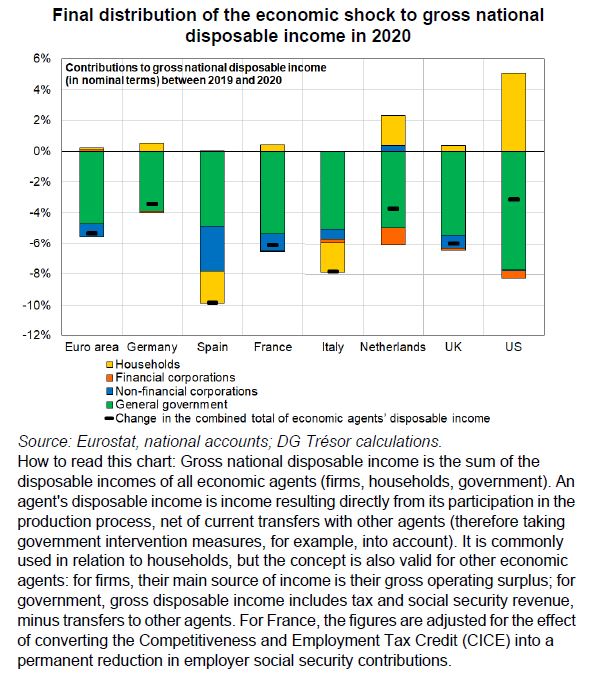Emergency Measures in Europe During the COVID-19 Crisis
The response of European governments to the crisis has been unprecedented. These measures have made it possible to absorb a large part of the loss of household and corporate income in 2020. In total, for the euro zone, public administrations have absorbed 88% of the shock suffered by private agents (87% in France). In particular, households' disposable income has been preserved overall, thanks in particular to partial activity.
Compared to previous crises, Europe's response to the COVID-19 crisis was unprecedented. In terms of the size of fiscal response, the emergency measures announced by France for 2020 and 2021 are close to the euro area average (5.7% of 2019 GDP, excluding deferrals of taxes and social security contributions and loan guarantees, vs 6.7%).
Taking the euro area as a whole, governments absorbed 88% of the shock suffered by private agents. Country by country, however, there were differences depending on the size of the shock and the scope of the measures taken in response.
Disposable household income was largely preserved by short-time working schemes, which on average accounted for a quarter of all emergency measure expenditure in the euro area. Italy, Spain and Austria saw a slight decline in disposable household income, whereas emergency measures gave rise to increases in France, Portugal, the Czech Republic and Belgium, despite significant economic shocks. While disposable household income also rose in Germany, Denmark, Sweden, Finland and the Netherlands, this was primarily because these countries were less severely impacted by the pandemic.
Even though similar private-sector support measures were introduced across the continent, the final impact of the pandemic on firms has been more uneven across European countries. Firms reported lower 2020 revenue in Italy, Belgium, France and Spain, whereas firms in Germany, Denmark, the Czech Republic and Sweden were not as hard it, due to the lower severity of the shock experienced in these countries. Dutch firms even saw increased profits, thanks to transfers to businesses
Now that the initial period of emergency is over, the recovery plans being implemented by European countries will supplement the fiscal response and help support the recovery.
